Sport at the crossroads: Rugby League's cultural shift
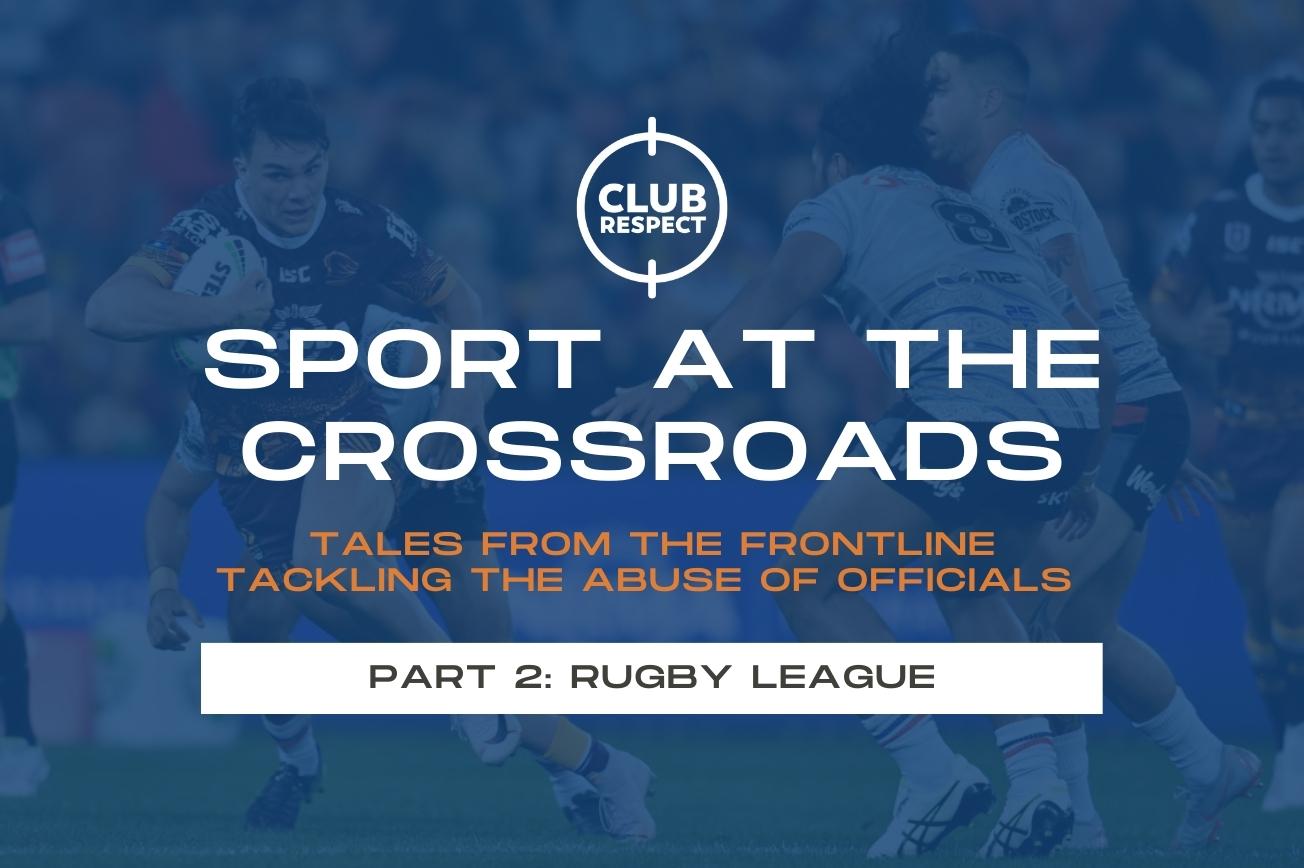
This is Part 2 of our ‘Sport at the crossroads’ series, exploring the way different sports codes and associations are tackling the abuse of officials.
Part 1: Football (Soccer)
Part 2: Rugby League
Part 3: Aussie Rules (AFL)
Part 4: Netball
Part 5: Rugby Union
Part 6: Basketball
Part 7: Cricket
Tales from the frontline tackling the abuse of officials – Rugby League
Every round during the NRL season, a community of rugby league fans unite on social media under the hashtag #refsfault. Often humorous, it is used to highlight instances of commentators, coaches and fans blaming the referees for their team’s performance.
Beyond the fans who are sympathetic to the tough job that rugby league referees have to perform, are a group of fans who abuse referees and embolden each other which sometimes escalates to extreme behaviour including death threats.
In 2018 the rugby league world was rocked by revelations that Matt Cecchin, the NRL’s top referee and his family had received death threats after he had made a critical but correct decision in a World Cup test match between Tonga and England.
Cecchin told the Sydney Morning Herald of his ordeal after he flew back into Sydney from New Zealand to an AFP escort and home under police guard: “It was really, really serious. I don’t like attention as a referee. I want to do my job without any fuss and then leave.”
“Imagine if I got the call wrong?” Cecchin asked incredulously.
The death threats were the culmination of continued criticism of referees in the first half of the season that led to Cecchin announcing his retirement.
For Cecchin, the fan abuse was unrealistic: “All this criticism about the referees is just pulling us together because all we’ve got is each other. We’re all judged as a collective on one person’s stuff up.”
Referees in all contact sports at times endure an unsafe workplace, including occasional physical abuse from players and fans but the cumulative effects of verbal abuse and its attendant mental health impacts took such a toll on Cecchin and other referees, that a request was lodged with the NRL for a full-time sports psychologist.
Cecchin explained: “If Cameron Smith played under the pressure of knowing that if he knocked on and cost his side the game he would definitely be dropped the next week, what sort of player would he be? I know that if I stuff up enough, I am not there next week. So when they say we’re not accountable, that’s crap. We’re one decision away from being dropped. There’s no player that has that.”
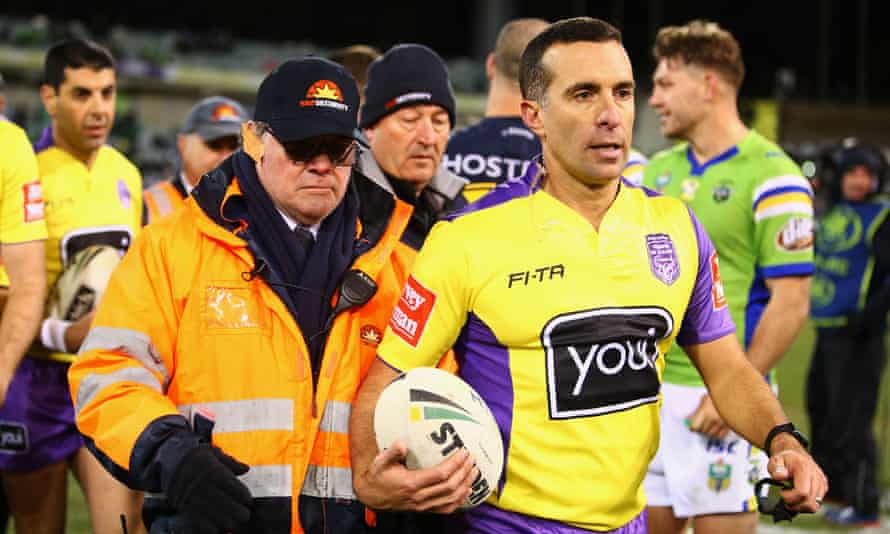
**
The situation had not improved by August 2021 with NRL referees boss Graham Annesley declaring that the criticism of referees was ‘Out of control’, blasting the coaches and commentators for their unjustified criticism and unrealistic expectations of officials.
“The level of criticism that’s been coming about match officials after games I think is over the top. I think it’s unjustified,” Annesley told the media.
“I just think (the criticism) has got a little bit out of control recently. We’ll see one incident in a game and then the whole post-match discussion is about that incident.”
For Annesley, it is a case of coaches, fans and media deflecting blame from their own clubs: “We focus in on one or two decisions that a referee might make and say, ‘We lost the game because of that’. Frankly, it’s just rubbish.”
The high passion levels of fans in the NRL is a double-edged sword for Annesley who feels the bias behind the abuse is obvious: “Although there are decisions that clubs don’t like, and that they may think should have gone the other way, they are not necessarily wrong decisions. If you ask the fans and the supporters of the opposition team, they’d be saying the decision is 100% right.”
The elephant in the room for Annesley is coaches, fans and media singling out one referee’s mistake over hundreds of player mistakes during a game.
“We’re not hearing anything about the 20 handling errors on average per game, we’re not hearing anything about the 60 missed tackles on average per game. We’re not hearing anything about the 30 ineffective tackles on average per game, or the 10 line-breaks on average per game that teams concede,”
“Each one of those incidents, I would say to you has a far greater impact on the outcome of the game than one or two refereeing decisions that might be arguable.”
**
Where does constant criticism and abuse of referees naturally land? A shortage of referees and match officials.
A google search on referee shortage tells a tale across the game of a challenge of recruiting and retaining match officials, particularly in country leagues across Australia.
In the NSWRL Group 4 rugby league zone in New England, referees were reportedly doing double shifts and matches were threatened with cancellations due to shortages.
No ref, no play!
**
What role modelling impact does the criticism of referees on television and social media have at grassroots level?
Junior referee Charles Townsend feels it has the greatest impact of any of the factors.
Townsend, who has refereed in the Balmain District Junior league for 8 years, feels strongly that the first place to start would be the games television commentators: “I find myself more and more amazed how poorly respected referees are by the NRL commentators and pundits, and how they focus on refereeing decisions after the game,”
“If they eliminated the relentless negative commentary about referees or the bunker during and after a game, it would have an instant impact. We could start with balancing it out with talk about good decisions, when refs get it right.”
For Townsend it can only change when there is a change in cultural attitude: “Whether we want to believe it or not, so much of how we view the game is by someone telling us how we’re viewing it and seeing it. If the commentators switched to neutrality or positivity, then over a small period of time, people would naturally think positively or neutrally about refereeing.”
Rugby league’s century of rampant tribalism has been leveraged into millions of fans and billions of broadcast dollars, creating big salaries for players and coaches and high stakes, impacting job security.
Townsend notes the impact: “Things happen in the heat of the moment and people don’t want to blame their own team or say they are wrong. They don’t want to say the other team is better than them. There is a third party and third option to blame and we often cop it.”
Despite the challenges Townsend sees a lot of positives in the role: “Getting involved in your local community by refereeing is a great thing to do. It’s powerful and inspiring to work with the grassroots volunteers and the players who are putting themselves out there for our entertainment. To see their skills grow and the camaraderie and friendships made is so rewarding. You also get paid and valued when a lot of other volunteers don’t.”
Unlike any other sport in Australia, rugby league referees are celebrities who are loved and hated, release biographies and are at the centre of the conversation. In the modern era, high-profile referees have been household names for rugby league fans: Hartley, Gommersall, Harrigan, McCallum, Cecchin, Perenara, Badger.
Some fans resent the referee’s high media profiles and being the centre of attention but according to Townsend there is no choice: “In rugby league, referees are not passive arbiters like umpires and officials in some other sports. A rugby league referee’s discretion impacts every play. Both mentally and physically, they are continuously active in the play.”
Although Townsend has been abused on a small number of occasions by coaches and spectators, for him it is minor compared to the great experiences and people he has met: “When abuse happens, I try to stay calm and in control, and remind myself that everyone out there is losing or winning, some are disappointed with their own performance or other people’s performance.”
Townsend believes referees should be released from the burden of compliance with a complete cultural refresh: “A cultural cornerstone of the game is yelling at the ref ‘Get em onside’. You’ll hear it from the first minute of play. It should be ‘Get Onside’ imploring your own team as a fan or coach to be disciplined. It shouldn’t just be the refs responsibility for teams to play within the rules.”
Beyond the cultural change, Townsend feel’s the Balmain Junior Association is on “the front foot” and he is happy with the level of policing of abuse offenders. Ground managers on his match days have the power to remove spectators, coaches and trainers from the ground at the referee’s discretion.
The issue however that nags Townsend the most is the accusations of referee bias from the NRL to grassroots: “By the time referees get to the NRL they have literally done thousands of games and there is no way they would show bias because they are under so much scrutiny by so many different people that it would ruin their career path.”
For Townsend, the referees do have control and are trying their best: “People need constant reminders that we are trying to make it safe and entertaining. And unfortunately, some people have a different opinion on how you can make it safe and how you can make it entertaining.”

**
The Canterbury Bankstown Junior rugby league competition is one of the most diverse in the world, representing successive waves of Australian migrant groups, sharing what was once an Irish Australian stronghold.
The 12 clubs that compete are drawn from all over the world and the majority of players are from a non-English speaking background. Running a competition like this is both rewarding and challenging and for General Manager John Grealy, protecting match officials is a zero tolerance game.
For his role to be successful, it is all about consistency in rules and clear communication: “You can’t give favours or be inconsistent because the clubs will get wind of it and you will be accused of favouritism. I strictly stick to the rules because I like rules, they are the same for all and without them there is anarchy. I am hoping the clubs respect me for it.”
The foundational problem begins when coaches, volunteers, parents of players and players don’t know what they are signing up for according to Grealy: “We are all bound by the NRL national Code of Conduct and when registration happens, a box is ticked to finish the registration and rarely do people know what they have signed up for. When something happens involving a referee and it is referred to, sometimes it’s the first time they have really read it.”
Previously, associations like Canterbury Bankstown heard their own Code of Conduct cases leading to wildly disparate sentences for similar offences across the state. This has been centralized with NSWRL now managing these by Zoom to maximise the consistency in penalties and allowing the use of precedence across the various associations.
In addition, the NSWRL operates an online facility where anybody can make a code of conduct report about negative behaviour removing the pressure from referees to be the only ones submitting reports.
The value of referees is crucial to the successful operation of his league and Grealy is clear that this needs to be reflected in harsh suspension deterrents: “My absolute pet hate is abuse of match officials so it’s something we have to stamp out. Penalties start at being sent off and serving two weeks for 9-12 year olds which has helped clean the problem up there with only 1 player in the last two seasons getting the two week holiday.”
Above the age of 12 is where Grealy believes the heavier penalties are necessary: “Penalties for verbal abuse start at a year and go up. Last year we lost one under 16 player for two years, this year another Under 16 player for 18 months. We have to get it through the heads of the club administrators and the players that the biggest penalties are going to apply and it’s not going to be tolerated. It’s all about respect and you’re not supposed to be abusing anyone at a game of footy, let alone a match official.”
It’s a challenging job but Grealy’s love of rugby league and how it brings people together overrides any negatives. His guiding principles are simple and trustworthy: “Protect your refs at all cost and at all times there is only one way to engage – treat ‘em fair, treat ‘em equal.”
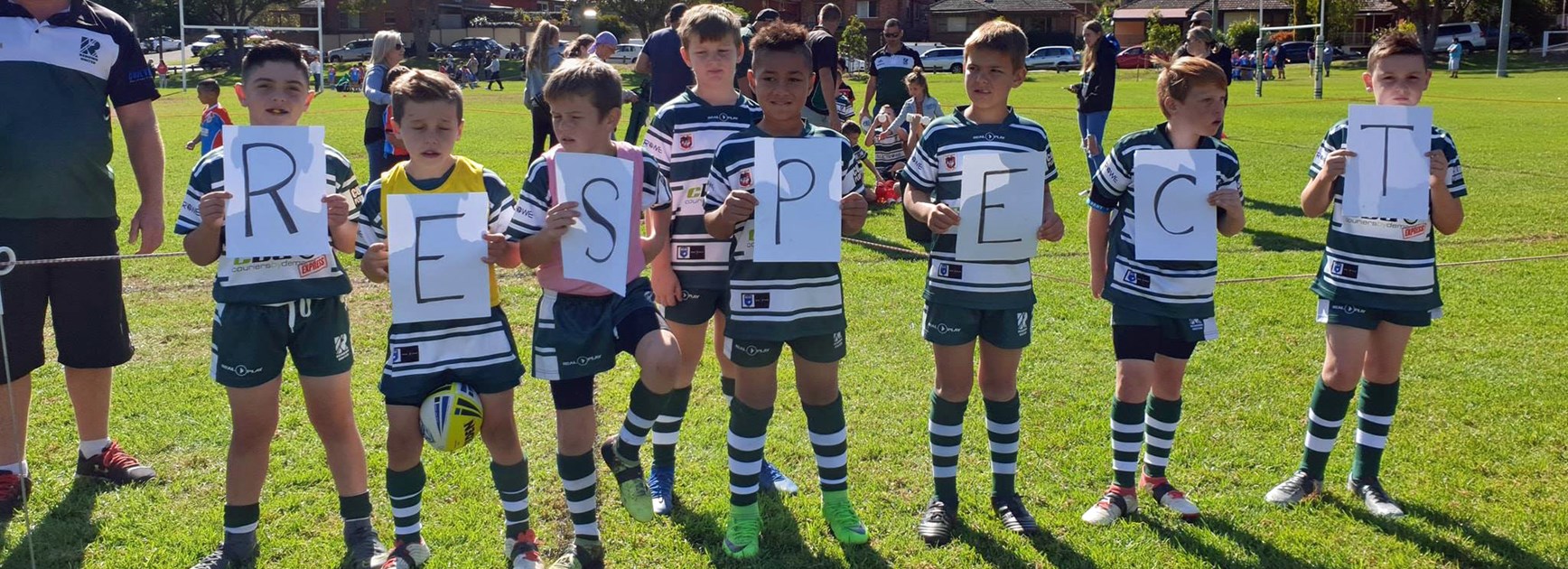
**
It clearly takes a cocktail of measures and there is no silver bullet to increase respect for and reduce abuse of match officials in rugby league.
But what is working?
A gleaming success story can be found in rugby league’s frontier in Victoria where the game has a much lower profile, embedded in an Australian Rules heartland.
Led by General Manager Brent Silva, NRL Victoria has executed a 3-year plan focused on recruitment and retention of match officials that has engineered a stunning turnaround: “We’ve had a growth in referee numbers in our ranks in the last three or four years. Part of that has been because we’ve invested in a resource dedicated to servicing the referee community as a single point of contact for mentoring, match day support, coaching, assessment and feedback.”
Part of the growth has come from Silva acknowledging the challenges and working with outside partners for outreach: “We worked with Club Respect to empower clubs to build a culture that calls out behaviours that don’t fit in with club values from players, to coaches, to referees to bystanders. Once the club acknowledges that abuse of officials is behaviour you don’t want at your club, it becomes part of the culture.”
Before NRL Victoria executed formal internal and external programs there were crisis moments with Silva noting: “We used to have a referee shortage and addressed that with adopting the ‘Spirit of League’ and ‘Tough Love’ strategy that came out of country NSW. A core priority for us is to protect referees and that involves removing any player, coach or trainer or spectator who breach the code of conduct. You add it all together and you increase your retention rates and support the growth of our referee numbers.”
Helping Silva balance between protecting his referees and player frustration is the fact that he is a referee and has great empathy with the challenges of the role, having seen it all at a personal level: “It’s a fact of life for community sports where emotion and passion are involved and people are going to have slips in their behaviour.”
Providing consistent support to referees on match day has also been a crucial mentoring and retention tool for Silva: “Having a coordinator for referees at each ground who is not from a club has been crucial. Sometimes referees are unsure of their performance and it’s great to have someone to bounce off and get things off their chest so they can referee again and not be despondent or intimidated by the environment. Pat you on the back if you’ve had a great day and suggest areas of improvement within a positive framework.”
Like many others in rugby league, he acknowledges that referees are an easy scapegoat: “You see classic blame deflection around a poor performance away from coaches or players. At the NRL level, headlines and commentary often features the referee’s performance rather than the players. That sets the tone for what the public sees and becomes acceptable for the local community.”
Abuse of referees is a transgression of basic societal principles according to Silva: “If someone is walking down the street, it’s not acceptable to stand there and abuse them. But spectators sometimes get the mob mentality which gives them a shield to abuse referees and players.”
Silva works hard to build a holistic sense of community between his clubs: “We all need to support each other. We can’t be picking fights because the sport suffers and it’s much harder work to maintain and grow. And referees are central to the growth, fairness and enjoyment of the game.”
A crucial component of increasing respect for match officials is the buy in from the key change makers: presidents and coaches. The core change comes from the top-down, living and breathing a set of values for a club to have a good reputation and not be known for anti-social behaviour
Silva is clear on the importance of their role: “They are the ones who determine the behaviour and culture of a club, how they behave on and off the field. If a coach is continuing to cause problems, the club has to take action and remove them – not tolerate it, and say ‘That’s not what our club is about’. The spectators and players will be led by what the coach does – good or bad, the coach gives them permission.”
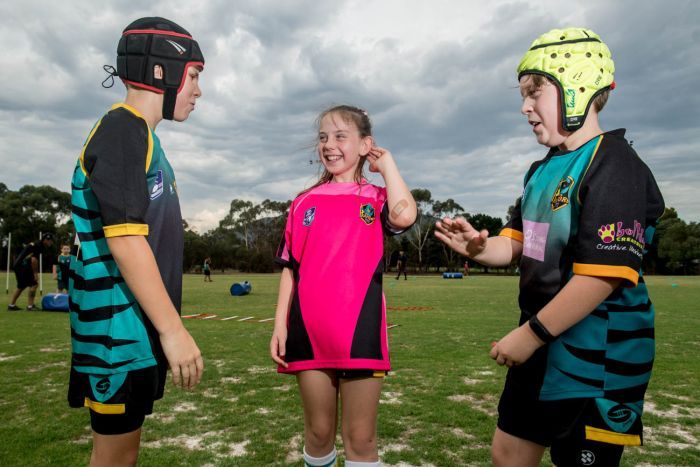
The final piece of NRL Victoria’s integrated program is incentives for good behaviour which was reinforced to Silva after spending a disproportionate amount of time with misbehaving clubs and not enough time with the clubs that were: “doing the right things.”
Silva felt more balance was required: “We were heavy on the stick when we introduced the ‘Tough Love’ program but we didn’t have any carrots. So we set up the ‘Spirit of League’ award to focus on what the spirit of the game was about and recognise and reward clubs that best represented that.”
In keeping with the zeitgeist, Silva introduced formal peer review to encourage behavioural improvement: “After each weekend’s game, we send out a survey to each club and we ask them to rate other clubs player, coach and spectator behaviour. The referee will also do an assessment and at the end of the year we tally up the scores and rank each club. Each year we can measure how we are going and adjust our programs accordingly.”
Symbols matter and Silva has ensured the priority of ‘The Spirit of League’ award by awarding the winner higher prize money than the first grade grand final winners.
When asked what his dream scenario looks like, Silva believes it is for all clubs to make the shift to a culture of self regulation: “You can put all the systems in place but ideally you want clubs to culturally call out that bad behaviour, saying it’s not acceptable and nipping it in the bud.”
“For all the clubs to realise that we need each other and we need our neutral referees, so let’s pull in the right direction together.”
Join the Club Respect mailing list
Read Next:
Part 1: Football (Soccer)
Part 2: Rugby League
Part 3: Aussie Rules (AFL)
Part 4: Netball
Part 5: Rugby Union
Part 6: Basketball
Part 7: Cricket
Also by Patrick Skene:
Feature article: Sport’s ugly blind spot – abuse of officials
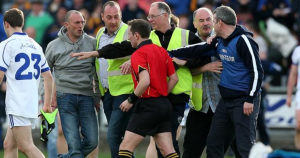

Patrick is a founder of Cultural Pulse, a leading micro-community marketing and engagement agency that has worked for the past 15 years on sports participation and fan engagement programs for over 100 communities. His recent book ‘The Big O, The Life & Times of Olsen Filipaina‘ has gone into reprint and his stories on the intersection of sport, history and culture have been published by The Guardian Australia, the Age, the Sydney Morning Herald and Inside Sport. He is currently the proud coach of the Rockdale Raiders Under 8B1’s.
Contact Patrick on twitter or LinkedIn